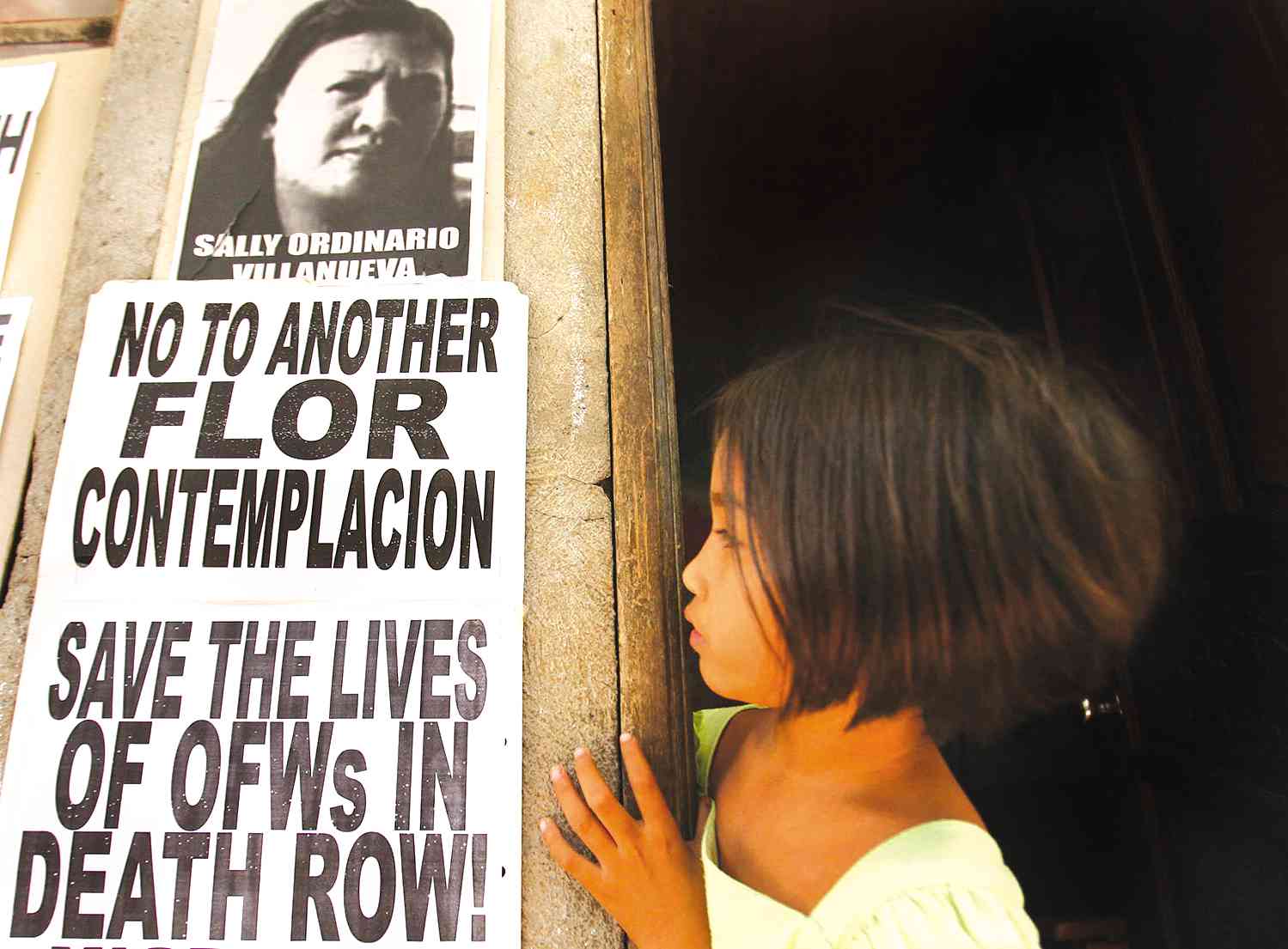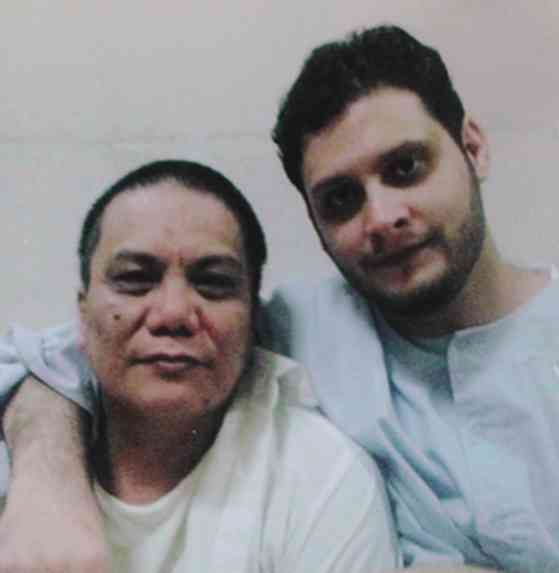Migrant workers on death row

A CHILD looks at the poster of Sally Ordinario Villanueva, one of the Filipinos executed for drug trafficking in China, at Batasan Hills, Quezon City. RAFFY LERMA
Melody Cortez charged her cell phone as she arrived home in San Pablo, Guagua, Pampanga, around 2 p.m. on June 13, 2007. She had missed several calls from an unknown number and when her phone rang again, she answered it right away.
“Your husband is gone,” the voice at the other end told her. The call was from the Department of Foreign Affairs (DFA). Shocked, she did not move for a few minutes. Reynaldo left her and their six children behind.
That very morning and on the previous day, Melody had gone to the DFA to inquire about her husband’s case. He had spent the last five years on death row in a Saudi Arabian jail for murdering a Pakistani in 2002. DFA officials repeatedly told her that they had no update on Reynaldo’s case.
Promises broken
“All my efforts were put to waste. All their [government’s] promises were broken,” Melody, 44, said as she sat on the same spot where she received the tragic news seven years ago.
Miles away, in Sukatani, Bekasi regency, West Java, Indonesia, Een Nuraini, 38, also recalled when she got news she had always dreaded. On June 18, 2011, Een received a call from the nongovernment organization (NGO) Migrant Care informing her that her mother, Ruyati binti Satubi, had been executed. Ruyati was accused of killing her female employer in Saudi Arabia.
The following morning, the Foreign Ministry director for legal aid and protection of Indonesians overseas, Tatang Budie Utama Razak, called up Een to extend the government’s condolences. The official said the government felt betrayed for not being informed by Saudi authorities on Ruyati’s execution.
“How come? We had submitted our report to the government since the very beginning but it was the government that had been clumsy in responding to the case,” Een said.
Before their execution, Reynaldo and Ruyati were but two of hundreds of migrant workers on death row. Official data show there are 280 Indonesian and 108 Filipino migrant workers on death row in various countries. The families of these migrant workers claim their governments are not doing enough to save their loved ones.
Slow response
In the case of Ruyati, Een said that when she learned of her mother’s arrest and detention on murder charges in January 2010, she filed a report with several government bodies, including the BNP2TKI, the Manpower and Transmigration Agency, and the Foreign Ministry.
Then silence.
In 2011 she saw a ray of hope when she was able to talk to the children of her mother’s employer several times. They told her that they had forgiven Ruyati and that they were convinced that Ruyati was not guilty of killing their mother.
“To me, it was just one more step left to see my mom return home safely. But it was the government’s clumsiness that had ruined everything,” Een said.
No legal assistance
An investigation by Migrant Care in August 2011 revealed that the Indonesian Embassy (KBRI) in Saudi Arabia never provided legal assistance to Ruyati, only Arabic translators. The KBRI did not even have documents related to Ruyati’s case.
“They are victims of the brutality of employers who have no respect for human rights. They also have fallen victims to migrant policies, both in Indonesia and destination countries, which lack seriousness in protecting the rights of migrant workers,” Anis said.
However, Foreign Ministry spokesperson Michael Tene said the case of Ruyati was an isolated one. “As far as I know, Ruyati’s case was the only case where Indonesian authorities were not informed by the Saudi government of their national’s conviction,” Tene said.
When sought for reaction, a DFA official, who requested anonymity, could not comment on Reynaldo’s case as he was not familiar with it.
“That moved fast,” he said, when told of the facts of the case. “For the order of execution to come down from the court to the governor’s office, that takes a month. That’s the first time I heard that. There’s probably some false information there,” he said.
Predictable
DFA’s response to Filipino migrant workers on death row does not come as a surprise for Migrante International, the largest alliance of overseas Filipino workers (OFWs). Its chair, Garry Martinez, said the government’s response had become predictable.
First, the Philippine Embassy and the DFA provide lawyers only after the conviction. Second, they would either send diplomatic missions or provide a small amount for the blood money, or the money paid to the families of victims, to gain freedom. Third, if nothing worked, government officials would offer condolences to the grieving families and hold a Mass.
That response is not good enough for Melody and other family members.
DFA and embassy officials in Riyadh had assured Melody that they were taking care of Reynaldo’s case. When Reynaldo attended his last hearing, no one from the Philippine Embassy accompanied him.
Without slightest hint
She did not have the slightest hint during her visit to the DFA on the day that Reynaldo’s life would end.
“He did not know, too,” she said as she looked past the open door. It was raining outside. A tinge of pain crossed her face.
While Reynaldo died without family, Rodelio Lanuza remembered the day well. Lanuza, an OFW serving time for murder with him in a Saudi prison, said he was beheaded around 7 a.m. and the Philippine Embassy officials went to jail two hours after the execution.
Lanuza was spared Reynaldo’s fate.
He spent 13 years on death row for killing an Arab in self-defense.
Lanuza said the Philippine Embassy in Riyadh knew about his case from the start and had advised him to surrender to the authorities.
When the first hearing took place, no government official went to the court. The father of the Saudi he had killed demanded that Lanuza be beheaded in front of him.
“I thought I was going to die that very moment,” Lanuza said. “I even called up my mother to say goodbye.”
The vice consul of the Philippine Embassy attended his second hearing.
Only after the court handed down a death sentence that the embassy hired a lawyer to file an appeal. That was the first and last time that a lawyer represented Lanuza in court. “Nothing came out of that appeal. I had been freed without a lawyer,” he said.
It was through the intervention of the Saudi Reconciliation Committee (SRC) that Lanuza was saved. For seven years, the SRC worked on Lanuza’s case and in 2011 negotiated a deal: Freedom for 3 million Saudi riyals ($800,000) as blood money.
Online campaign
With the government refusing to provide legal support (official policy prohibits the use of taxes to save convicted criminals), Lanuza started an online campaign on his cell phone, “Barya Mo, Buhay Ko” (Your Coins, My Life).
He raised $57,000 from donations. Saudi King Abdullah provided $613,000 of the blood money. The Philippine government was the last to give financial support, Lanuza said. He waited for one month for the government to deposit its share of $130,000.
Lanuza lamented that for 13 years inside the Ammam jail, Philippine Embassy officials would visit detained Filipinos once a year. “They would not even talk to us. They just recited our names to know if we were still there.”
Angered, frustrated
Others share their anger and frustration with the way Philippine authorities neglect Filipinos on death row.
Norie Gonzales has two brothers on death row in Saudi Arabia. Edison and Rolando Gonzales were convicted in 2007 with the murder of Filipinos Romeo Lumbang, Jeremias Bucud and Dante Rivero.
DFA officials assured her that they were monitoring the case and instructed the family not to publicize the issue because the case was confidential.
On June 23, 2007, Norie received a call from Edison. “He was crying. He told me that they have been sentenced to death. It felt like it was the end of the world.”
Out of desperation, Norie went to two of the TV stations in Manila. For her, it was the only way to get the Philippine government to take the case of her brothers seriously.
She said it was only in April 2008 that the government provided a lawyer. At first, the DFA said it had no money to hire lawyers and asked the families to pay for P150,000 ($3,430) each for the legal expenses. She said that it was only when the family took the story to the media that the DFA officials retract their demand.
The brothers have been on death row for eight years. Norie waits for the day her brothers would come home, especially that the families of the two slain Filipinos have given their forgiveness.
Laws protecting workers
She lamented how the government was neglecting OFWs who contribute so much to the economy.
Both the Indonesian and Philippine economies hugely benefit from labor export.
In the Philippines, cash transfers from migrants accounted for nearly a tenth of the $280-billion economy last year, according to the Bangko Sentral ng Pilipinas. In 2013, the inflow of remittances boosted gross national income growth to 7.1 percent from 5.7 percent in 2012.
Indonesia’s BNP2TKI said the overseas remittances by migrant workers amounted to Rp88.6 trillion ($7.35 billion) in 2013.
Both countries ratified the International Convention on the Protection of the Rights of All Migrant Workers and Members of their Families—the Philippines in July 1995 and Indonesia in May 2012.
The Philippines passed Republic Act No. 8042, the Migrant Workers and Overseas Filipinos Act of 1995. The Act provides a mechanism to ensure the “rights and interest of distressed overseas Filipinos, in general, and Filipino migrant workers, in particular, documented or undocumented, are adequately protected and safeguarded.”
The Act also provides for the establishment of the Legal Assistance Fund to be used “exclusively to provide legal services to migrant workers and overseas Filipinos in distress.” Under the law, government should set aside P100 million ($2.29 million) in the OFW Legal Assistance Fund.
Whenever a Filipino finds herself or himself in legal trouble, the DFA source interviewed for this story said the government tried to give the best legal assistance it could afford.
4,000 to 5,000 cases
Unfortunately, resources are stretched. In the DFA’s Migrant Affairs office, about 30 case officers handle a docket of 4,000 to 5,000 cases at any given time. Hiring lawyers is also expensive, so the DFA tries to be as selective as it can. “You want to target your resources to where you can be most effective,” he said.
In Indonesia, the government issued Law No. 39/2004 on the placement of Indonesian migrant workers.
Dinda Nuurannissaa Yura, Women’s Solidarity head of migration, trafficking and HIV/AIDS division, said Law 39 did not establish worker and employer rights and responsibilities and instead regulated the dispatching of migrant workers by placement agencies.
The law, for instance, does not provide details of what legal assistance migrant workers can access in times of crisis. It does not cite any responsibility of destination countries for the protection of the rights of migrant workers.
“Unfortunately, what we’ve seen in Law 39 is just trafficking legalized by law,” Dinda said.
Reforms
Dinda’s group is calling for the revision of Law 39 to provide Indonesian migrant workers adequate protection.
For Migrante International, the Philippine government must provide immediate legal assistance to Filipino migrant workers in distress.
Migrant organizations in both countries were critical of the proposals that focus on raising funds for blood money. Migrante International said it was a reactive and unsustainable response. For Indonesia’s NGOs, paying blood money should no longer be the primary solution although Indonesia has a huge source of money to pay compensation to the victim’s relatives.
The NGOs are calling for tougher political diplomacy and a comprehensive protection mechanism to protect Indonesian migrant workers from violence and rights violations.
Shattered dreams
For the families of executed migrant workers, the loss is incalculable.
Een, one of the three children of Ruyati, said her mother left Indonesia to work only because she wanted to improve their lives. She said Ruyati longed to see Epi Kurniati, her second child, achieve her dream of becoming a nurse in East Jakarta.
Ruyati’s monthly salary of around 600 riyals ($160) on her first and second trips allowed her to send money for Epi’s tuition and to buy her son Iwan Setiawan, a minivan for work.
Een said Ruyati decided to go to Saudi Arabia for the third time, hoping to save money for the family. “We didn’t expect that her wish to help our family would end in a single stroke of a sword,” Een said.
As for Melody, life without Reynaldo goes on. “It has been so long,” she said.
Didn’t see father
Ace, the youngest of six children, is now 15. He never saw his father. Reynaldo went to Saudi Arabia in 1998 while Melody was pregnant.
Girlie, the eldest daughter, is busy tallying her sales for the day. She is selling dressed chicken at the market. When we told her we wanted to interview her mother about Reynaldo, she said, matter-of-factly, “I had a nervous breakdown after that,” referring to the grim incident.
Their brother, Allan, takes the family album from the bedroom and points to his father’s picture. Reynaldo, wearing a white shirt and denims, is smiling as his children’s sad eyes stare at the father they lost too young and too soon.
(Paolo Montecillo of Philippine Daily Inquirer, Ronalyn V. Olea of Bulatlat.com and Elly Burhaini Faizal of Jakarta Post are Konrad Adenauer fellows at Ateneo de Manila’s Asian Center for Journalism.)
108 Filipinos on death row
280 Indonesians on death row























